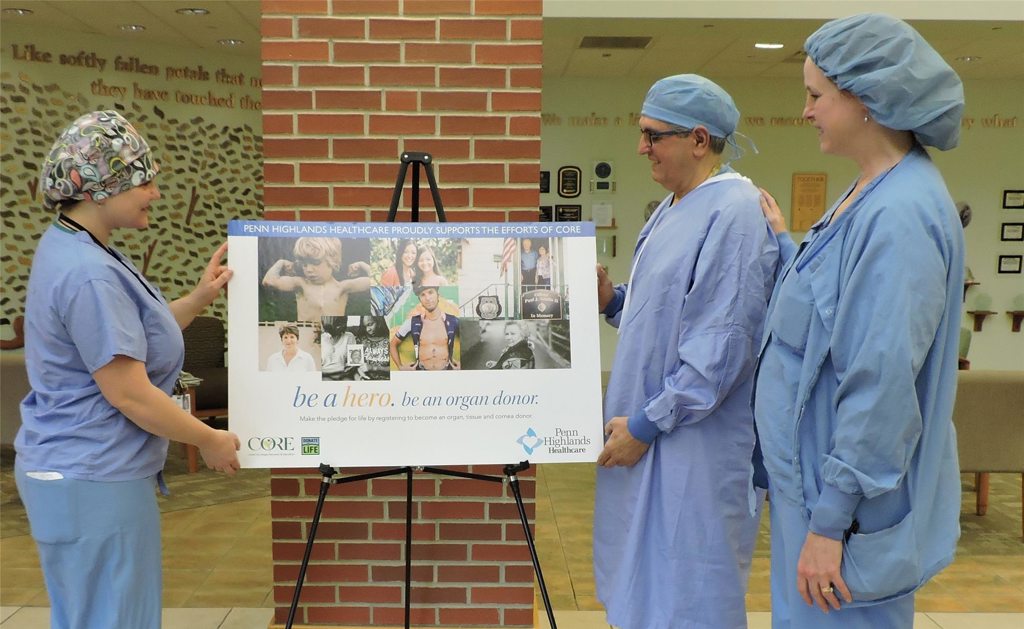
Giving Of Herself To A Co-Worker
Liver Transplant Between Staff
Most people give co-workers small gifts – little tokens of appreciation. But Angela Hepler is an exception. She is giving her co-worker a second chance at life.
Hepler works with Denny Charles in the Operating Room at Penn Highlands DuBois. She is a certified registered nurse anesthetists, or CRNA, and provides anesthesia during surgery. Charles is an registered nurse who provides support and assistance during operations. He and Hepler work alongside each other regularly.
Twenty years ago, Charles was diagnosed with a fatty liver that progressed to NASH, non-alcoholic steatohepatitis. With NASH, the liver is inflamed and there is liver cell damage along with fat in the liver.
This diagnosis was not a surprise because, according to Rhanda Charles, Denny Charles’ wife who is also a CRNA at PH DuBois, the disease is being diagnosed more often today.
But what was a surprise came later. Blood work at the office of Dr. Ralph Cardamone of Clearfield, his cardiologist, showed pancytopenia- a medical condition in which there is a reduction in the number of red and white blood cells, and platelets.
That meant a trip to Dr. Nihar Patel, a medical oncologist with Oncology Hematology Associates of Northern Pennsylvania PC, a part of Hahne Regional Cancer Center, a service of Penn Highlands Healthcare in DuBois. An ordered ultrasound of the abdomen found a cancer mass, a tumor, on the liver. A biopsy was performed by Dr. Waqar Shah, an interventional radiologist of DuBois Radiology Associates, and it confirmed the diagnosis of cancer.
Charles then heard from Dr. Richard Latusksa, gastroenterologist of Penn Highlands Healthcare, and was sent immediately to Dr. David Geller of the UPMC Liver Cancer Center, Pittsburgh.
Because of the original liver disease, removing a section of liver was not possible. Charles needed a liver transplant. That was October 2016.
The waiting time for a liver transplant is different for each person, according to the Liver Foundation. The time a person spends on the waiting list depends on his or her blood type, body size, stage of liver disease, overall health and the availability of a matching liver. In the United States, there are currently over 16,000 Americans on the waiting list for a liver transplant.
While on the transplant list, Charles received TACE, transarterial chemotherapy embolization, in which cancer-fighting medications are given to keep the tumor from growing. He also took oral chemo medications. If the tumor grew larger, he would be off the transplant list.
“We were waiting for a cadaver liver,” Rhanda Charles said. “But he kept getting sicker and sicker.”
That’s when Hepler – who has worked with the couple for only two and a half years - stepped in. Hepler said she saw her friend’s father go through a double-lung transplant and almost not make it. “I wanted to keep that from happening to Denny,” she said.
Hepler did her research, talked to her husband and then cornered Rhanda Charles at work.
“It’s scary to put someone else at risk,” Rhanda Charles said, but Hepler insisted. “There was no talking me out of this,” Hepler said. Hepler’s husband told her that he wasn’t surprised she would do this. “He was worried but he backed my decision.”
A few days after the initial offer, Hepler called the right people and had testing done. According to Hepler’s research, 40 percent of the time a donor comes forward, it is a match. “It’s not as tricky as a kidney,” she said. Blood type must be a match. The donor should be in good health and between age 18-55.
Hepler was in the 40 percent; she was a good candidate for Denny Charles!
Their surgeries are scheduled for later this month. Denny Charles will receive 60 percent of her right lobe. Hepler will keep her left lobe.
Since the liver regenerates, Hepler explained, her left and his new right lobe will both grow to the size of a complete liver. Both lobes perform the same functions, so there will be no noticeable difference.
The two co-workers will have six hours of surgery a piece. One will start before the other, so the whole procedure will be 8-9 hours including the overlap. They will have adjacent rooms.
Full recovery will take about 12 weeks for each of them, and approximately 8 weeks of time away from work.
“I’m extremely proud of strong relationships that we have with one another in the Anesthesia Department and the Operating Room,” Aaron DeVallance, CRNA and Anesthesia Service Line Director for Penn Highlands Healthcare, said. “They are a very close-knit group and treat each other as family. The entire staff has come together to support Angela, Denny and Rhanda by whatever means possible.”
Denny Charles will be on anti-rejection medications the rest of his life. Hepler will have no restrictions.
“My family is ecstatic,” Denny Charles said. “There is a lot of evil in this world, but there are angels.”
Hepler credits her family for their support. “I couldn’t make this happen without the support of family – my parents and my sisters are already planning schedules around me.” She’s a little nervous off and on, but “nothing will change my desire to do it.”
As April is Organ Donation Awareness Month, learn more about organ donation in the Your Life section of this edition.
